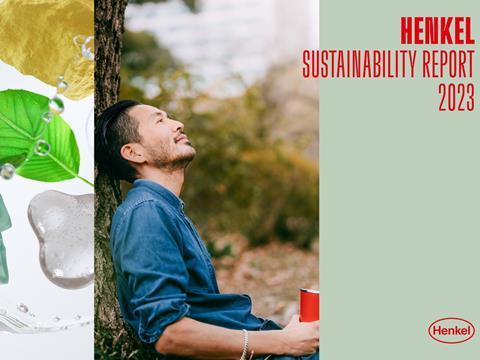
Henkel has published its 2023 Sustainability Report on the progress of its global sustainability strategy, with findings including the worldwide share of recycled plastic increasing to 19% and a 61% reduction in CO2 emissions in production.
The company says it particularly focused on the use of renewable energies and the promotion of the circular economy, with the share of purchased electricity from renewable sources increasing to 89%. Apparently, 14 further sites have been converted to carbon-neutral production and the recycled content level for the entire universal liquid detergents portfolio in Europe, such as Persil, has been doubled to 50%.
“Sustainability is a central pillar of our Purposeful Growth Agenda,” said Carsten Knobel, CEO of Henkel. “Especially in challenging times like these, sustainable action is more important than ever. We are therefore working continuously on the implementation of our sustainability goals, and I am proud that we made very good progress again in the course of 2023. Our excellent results in leading external ESG ratings, for example the repeated EcoVadis Platinum achievement, show that we are on the right track and that our progress is recognised.”

Henkel also states it has continued its efforts to protect natural resources. At the end of 2023, the company reportedly covered 96% of its global demand with sustainably certified palm (kernel) oil and reached a traceability rate up to the mill of 89%.
At the end of last year, Henkel Adhesive Technologies announced its new DAREX WBC 711 sealant for food cans, said to reduce GHG emissions by 30% compared to its predecessor. Compatible with hot and cold filling, double seaming with or without steam injection, and the following pasteurization or sterilization, the water-based sealant is designed for traditional shower head and die lining applications.
Last month, a report from Metal Packaging Europe and European Aluminium stated the overall recycling rate for aluminium beverage cans in the EU, UK, Switzerland, Norway, and Iceland reached a ‘record level’ of 76% in 2021, with the 3.2% increase apparently bringing the total amount of aluminium recycled from cans up to 570,000 tonnes –, a 60,000-tonne increase from 2020. However, the report still encouraged the introduction of more ambitious separate collection targets for beverage containers to reach 90% recycling targets.
If you liked this story, you might also enjoy:
The Brief: How viable is biorecycling for plastics?
Report: How the top brands are progressing on packaging sustainability
The Brief: Using ocean-bound plastic in packaging – how, why and should we?














No comments yet